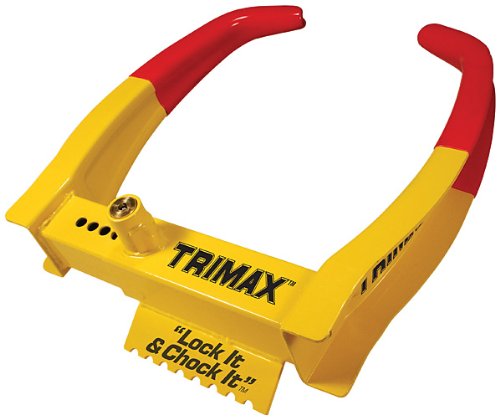Last year there was a ring of cargo trailer thefts in Colorado, with hundreds of trailers stolen. Some were found, but many were not. Unfortunately there are indications that vehicle theft in Colorado, including theft of trailers is not on a decline.
According to the Colorado State Patrol, Denver has five thefts per 1,000 cars… Denver, Aurora, Colorado Springs, Lakewood and Adams County have all been targeted by Colorado State Patrol for the shockingly high number of thefts that occur in that area. In fact, more than 11,000 car thefts occurred in 2010 in Colorado, costing the state somewhere around $72 million in losses. (Source HG.org)
If you have a cargo trailer, vehicle trailer, RV, pop-up camper, extra vehicles/trucks, or boat in Colorado (or anywhere else), it would be wise to prevent theft.
Here are a few ways that people secure their vehicles/trailers to prevent theft:
1. Trailer Hitch Lock – There are a variety of locks available for trailer hitches, whether it is a gooseneck type hitch, or ball hitch, at minimum having a lock can deter a theft of convenience.
2. Wheel Lock – Similar to when your car is booted after being illegally parked, this is a large locking attachment that can prevent a car or trailer from rolling away by the hands of a thief.
3. GPS – Not only can car dealers and lenders attach a GPS unit to a vehicle, there are GPS systems sold for consumers to have installed on their vehicle or trailer. GPS systems vary, but can include geo-fencing that will notify you should your vehicle/trailer move outside of the fenced area, and giving you and the police a better idea where to recover it quickly.

4. Storage Facility – Another option is to store your vehicle or trailer in a secure storage facility. This allows greater peace of mind, especially when you are away from home, or can only store a vehicle or trailer on a street or in your driveway. Our Fort Lupton facility gives you the convenience of 24/7 access, but gives you peace of mind with secure gate access, 24/7 video monitoring, and oversized fencing around the grounds.
Keep your toys, or your business assets secure by storing them properly to prevent theft. If you are looking for storage for a vehicle, trailer, boat, or RV, we are glad to help. Whether it’s for a few days a week between jobs, or for a season, we can customize a bid for you based on the space needed, and time needed. Give us a call at 303-219-4787.







 When you’re choosing where to store your boat, you’re looking for convenience and affordability. If you’re like most boat owners, your impression will resonate with these four advantages of choosing to store your boat at Colorado Secured Storage in Fort Lupton Colorado.
When you’re choosing where to store your boat, you’re looking for convenience and affordability. If you’re like most boat owners, your impression will resonate with these four advantages of choosing to store your boat at Colorado Secured Storage in Fort Lupton Colorado.
